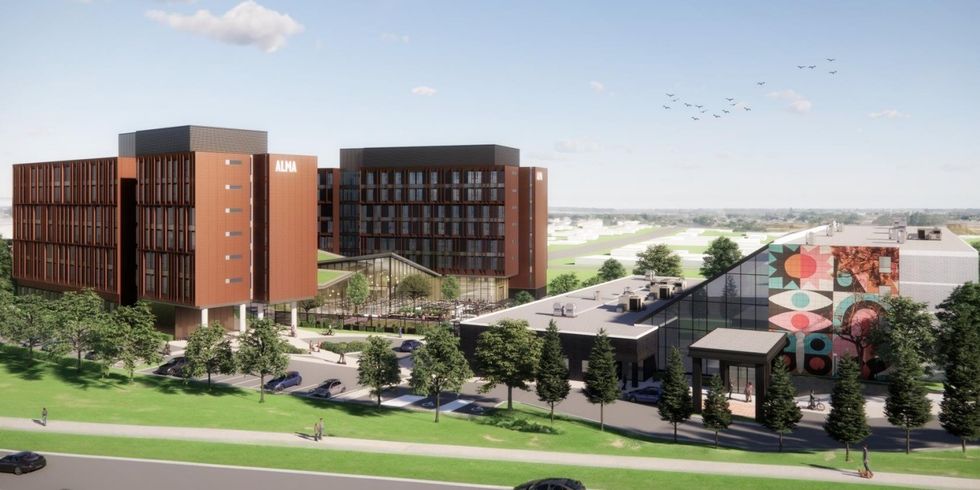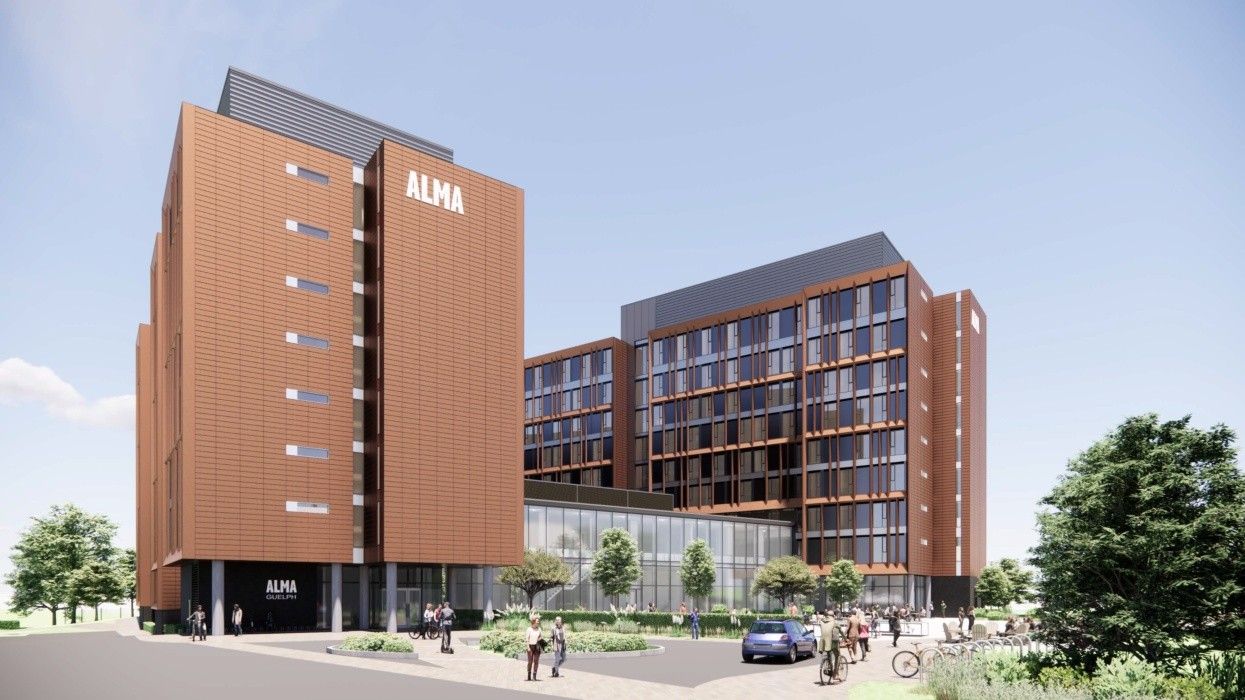[Update: After a special meeting on May 15, Council informed Forum on May 29 that it was dismissing their complaint and that they must still pay fordevelopment charges. Forum has until July 8 to file an appeal with the Ontario Land Tribunal.]
On April 7, Toronto-based Forum Asset Management announced that it was pausing construction on a student housing project in Guelph, Ontario as a result of the City of Guelph deciding to levy $15.5 million in development charges (DCs) on the project, the latest chapter in the ongoing debate over government taxes on development.
The project at hand is a two-phase project called ALMA @ Guelph located at 601 Scottsdale Drive, across the street from Stone Road Mall. The site is also located approximately two kilometres west from the University of Guelph, which is leasing the land to Forum Asset Management.
Phase One of the project saw Forum Asset Management convert the Holiday Inn that was occupying the site into student housing, an asset class Forum has been very focused on. The project delivered 177 beds and hotel-like amenities, was completed in 2023, and won NAIOP Toronto's award for Development of the Year in 2024.
Phase Two is then planned to consist of two new seven-storey buildings that would deliver 489 units with a total of 587 beds. It will be located on a three-acre site directly to the west of Phase One and was scheduled to be completed in time for the Fall 2027 semester, had construction commenced this month as originally planned.
DC By-laws and Bygones
In their press release on April 7, Forum Asset Management said that no development charges were levied on Phase One, but that the City of Guelph is now imposing $15.5 million in development charges on Phase Two. Forum called the decision "a reversal by the City's finance and legal departments and render the project economically unviable without significantly raising student costs," adding that they would be filing a formal complaint.
According to the City, Phase One was approved under the City's 2019 DC By-law, which included an exemption for land owned by the University of Guelph that is being developed for "University Related Purposes."
However, in 2022, the City of Guelph commenced a Development Charges Background Study that completed with the 2019 DC By-law being repealed and a new DC By-law being adopted in 2024. Under the 2024 DC By-law, the definition of "University Land" was narrowed to only include lands "intended to be occupied and used by the university."
The City's Position
The City's stance — outlined in written submissions filed for the hearing — is that Phase Two is a separate development application that is subject to the 2024 DC By-law. The City notes that the ground lease agreement between the University and Forum explicitly states that there is no partnership between them and that the University essentially has no part in the project other than being the landlord, although the University has approval power regarding the design.
In a report in November 2024, City staff determined that Phase Two would be subject to between $15,586,875 and $20,655,360 in development charges. Forum responded in both February and March outlining its position that Phase Two should not be subject to development charges, but the City reiterated its stance, which is that Forum will be the user and occupant of the building.
"By the terms of the Lease, the University will not occupy or use the buildings, collect or set rents, determine tenancy periods, address tenant issues or complaints, provide University services such as Resident Advisors or teaching and research facilities, or administer the operation of the Phase 2 building directly or indirectly," said the City in its submission. "Forum will not undertake any of these activities on the University's behalf. The University's role with respect to the Subject Property is limited to that of a landlord."

Forum Asset Management's Position
In an emailed letter detailing its complaint, Forum's legal representative said that the City's stance "confuses 'use' and 'occupation' with the corporate structure both the University and Forum thought best to facilitate the realization of this critical student residence project for the University."
"The City would clearly agree that if the University owned the land and financed and built a student residence itself, the student residence would be exempt from Development Charges under the Act," they said. "It therefore logically follows that this Student Residence is also exempt from Development Charges. In both circumstances, the use and occupation remain the same. The building is being used and occupied by the same University students. Forum may [be] operating the Student Residence, through the arrangement secured by the Lease entered into with the University, but Forum is not using and occupying the building."
Additionally, Forum also argues that "uses" are governed by Official Plans and Zoning By-laws and are referring to land use, which in this case is as a student residence. They note that under their lease agreement, "the only permitted use is a student residence use which is for the exclusive use and occupation of University of Guelph students." Furthermore, Forum says that the City is "unnecessarily restricting the University’s ability to deliver student housing" by taking the position that the University cannot enter into a lease with Forum and still take advantage of a development charge exemption.
Who Benefits?
Although both sides focus on the semantics of "use," the subtext of the conflict appears to be who ultimately benefits.
Forum points to the shortage of student housing for the University of Guelph, which had a waitlist of over 1,300 students in 2024 and has said that it wants to have 9,000 beds available within the next 10 years. Forum says it has the expertise to help the University with this, but that "the project is not viable should Development Charges be imposed."
The City, however, views it differently, saying that "Forum stands to minimize risk and make significant profits from Phase 2, by shifting the cost of public services and infrastructure required by developing the Subject Lands to existing City taxpayers" and that "The burden of approximately $17 million would result in a subsidy to the private sector at the expense of the public, contrary to the purpose of the DC Act and 2024 DC By-law and not in the public interest."
On the importance of more housing, the City says, "Building above-market residential units is an unproven strategy to address housing availability and affordability in Canada" and that "If Forum wishes to address the City's housing affordability issues and the University community's need for affordable student housing and make use of the exemptions under the 2024 DC By-law, it can do so by entering into an agreement with the City to provide Affordable Residential Units as defined in section 4.1 of the DC Act and which are exempt from development charges under section 3.5.4 of the 2024 DC By-law."
"The University's own housing study has found that it is University-operated housing that is needed to meet student residence demand," the City added. "The study specifically found that for-profit purpose-build student housing in the City was not aligned with student needs. Forum's Phase 2 development is part of an investment portfolio designed to enhance yields and returns, 'focused on high-turnover rental housing, allowing investors to benefit from long-term supply shortfalls in Canadian housing, with more frequent mark-to-market of rental income.'"
Development Charges
Like other local governments across the country, the City of Guelph collects development charges "to fund the capital costs of enabling and servicing growth" and believes that "Arbitrary exemptions from development charges shifts the burden of growth capital costs on to property tax and utility ratepayers and is detrimental to overall housing affordability."
Whether growth should be primarily funded by new construction is at the core of the debate over development charges, with many governments taking the stance that "growth should pay for growth" and developers arguing that this is unfair because existing residents also benefit and that the fees they collect increase the cost of new housing.
Raising property taxes is something that politicians are generally wary of doing, thus development charges have increased at a much higher rate than property taxes across many cities across Canada. When the real estate market was strong, developers could either eat the cost or find buyers to pass along the costs to, but economic conditions are tough now, buyers are sitting on the sidelines, and development charges are increasingly becoming a deciding factor in whether projects can move forward. As developers like to point out, if projects cannot move forward, there will be no development charges for local governments to collect.
Forum was hoping to have their complaint resolved in April so construction could commence and the student housing could be available for the Fall 2027 semester, but unfortunately the window has now passed. A special council meeting was scheduled for April 29, but was postponed indefinitely due to a powerful storm that resulted in power outages. The City appears to be holding firm, however, going as far in its written submissions as accepting that Forum will appeal its decision to the Ontario Land Tribunal.





















